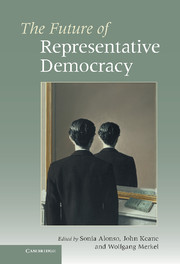Book contents
- Frontmatter
- Contents
- List of figures
- List of tables
- Notes on contributors
- Acknowledgements
- Editors' introduction: Rethinking the future of representative democracy
- 1 Representative democracy and its critics
- 2 Representative democracy and the populist temptation
- 3 The wider canvas: representation and democracy in state and society
- 4 Performance and deficits of present-day representation
- 5 Do parliaments have a future?
- 6 Engendering representative democracy
- 7 Representative democracy and the multinational demos
- 8 Diagnosing and designing democracy in Europe
- 9 Monitory democracy?
- 10 Representing nature
- 11 Democracy and representation beyond the nation state
- General bibliography
- Index
- References
10 - Representing nature
Published online by Cambridge University Press: 05 June 2012
- Frontmatter
- Contents
- List of figures
- List of tables
- Notes on contributors
- Acknowledgements
- Editors' introduction: Rethinking the future of representative democracy
- 1 Representative democracy and its critics
- 2 Representative democracy and the populist temptation
- 3 The wider canvas: representation and democracy in state and society
- 4 Performance and deficits of present-day representation
- 5 Do parliaments have a future?
- 6 Engendering representative democracy
- 7 Representative democracy and the multinational demos
- 8 Diagnosing and designing democracy in Europe
- 9 Monitory democracy?
- 10 Representing nature
- 11 Democracy and representation beyond the nation state
- General bibliography
- Index
- References
Summary
Introduction
If I want to speak on behalf of orange-bellied parrots whose habitat will be destroyed by a proposed development, in what sense can I act as their political representative? I have no basis upon which to claim I am their delegate because I have no mandate or authorisation from parrots to speak on their behalf and I cannot justify my arguments or actions to them. I have no expertise in ornithology and I do not (I hope) resemble a parrot or share or understand a parrot's view of the world to claim authority to speak on the basis of a common parrot identity. Nor can I claim to be their trustee in the Burkean sense, because Burke disingenuously supposed that the trustee's authority to represent his/her constituency was based upon common interests and sympathies that were reciprocal, not one-way. All I can claim is that I care about the fate of the parrots.
This chapter seeks to explore the idea of representing (non-human) nature as a democratic task that involves persuading others to care about not just parrots but non-human species in general in order to support measures for their protection. Michael Saward has called this discursive task ‘representative claim making’, but I shall call it ‘nature advocacy’ (Saward 2006). Like the legal advocate, the nature advocate seeks to speak for someone or something by putting their case in the best possible light.
- Type
- Chapter
- Information
- The Future of Representative Democracy , pp. 236 - 257Publisher: Cambridge University PressPrint publication year: 2011
References
- 20
- Cited by

